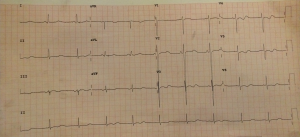On a sunny mid-afternoon day, a 31 year old male presents to the ED after falling down a flight of steps and complaining of LE weakness. Exam significant for LE strength 4/5 proximally and 5/5 distally. Pt had a carbohydrate loaded dinner the night before and ran a 5K the morning of sx onset. ECG is below.
What is your interpretation of the ECG?
What is your diagnosis and how would you manage this condition?
Any pitfalls or alternative diagnoses you may want to consider or test for?
The best response by June 20th wins.
Good luck everyone.. Let the games begin!
The views expressed on this blog are the author's own and do not reflect the views of their employer. Please read our full disclaimer here. Any references to clinical cases refer to patients treated at a virtual hospital, Janus General Hospital.
The following two tabs change content below.


Yonatan
Latest posts by Yonatan (see all)
- Morning Report: 6/29/2015 - June 29, 2015
- Rhythm Nation June 2015 – Answer! - June 20, 2015
- Rhythm Nation June 2015 - June 13, 2015
- Rhythm Nation January 2015 Answer! - January 18, 2015
- Rhythm Nation January 2015 - January 9, 2015


Hypokalemia:
Leads to muscle weakness/rhabdo, and EKG changes, though weakness is usually only seen with serum levels <2.5
Hypoglycemia on the EKG can show:
-Bradycardia (athletes can have sinus bradycardia and that would be worsened by hypokalemia)
-ST depression and U waves leading to the sinusoidal like waveforms seen in V2-V6
-QT prolongation (all leads on this EKG)
Management:
–We need to watch for the life threatening issues: (arrhythmias, paralysis, rhabdomyolysis, and diaphragmatic weakness)
–If shock panel confirms we should replete K+
–We should check Creatinine level for Rhabdo
–Check a Mag level in case of concomitant hypo-mag as K+ replacement may be unsuccessful without concomitant Mag+ replacement.
Forgot to mention the cause:
If the patient was drinking pure water he can have dilution hypokalemia (drinking lots of water and not electrolytes)
This would be worse with the carb loading (high insulin levels that he produced to absorb the carbs will drive K+ into the cells) particularly if he’s be eating only pure carbohydrates for the last 24 hours.